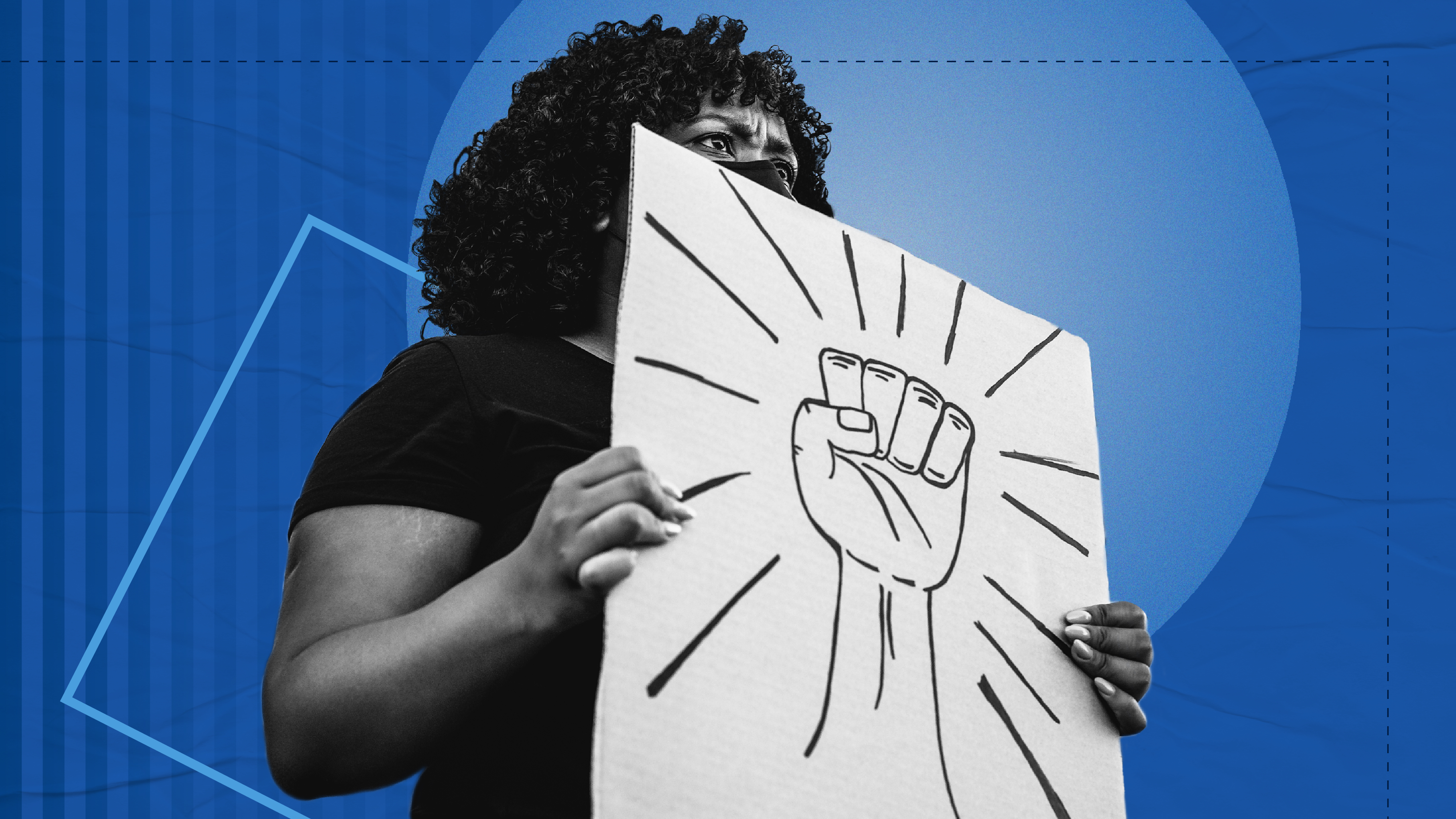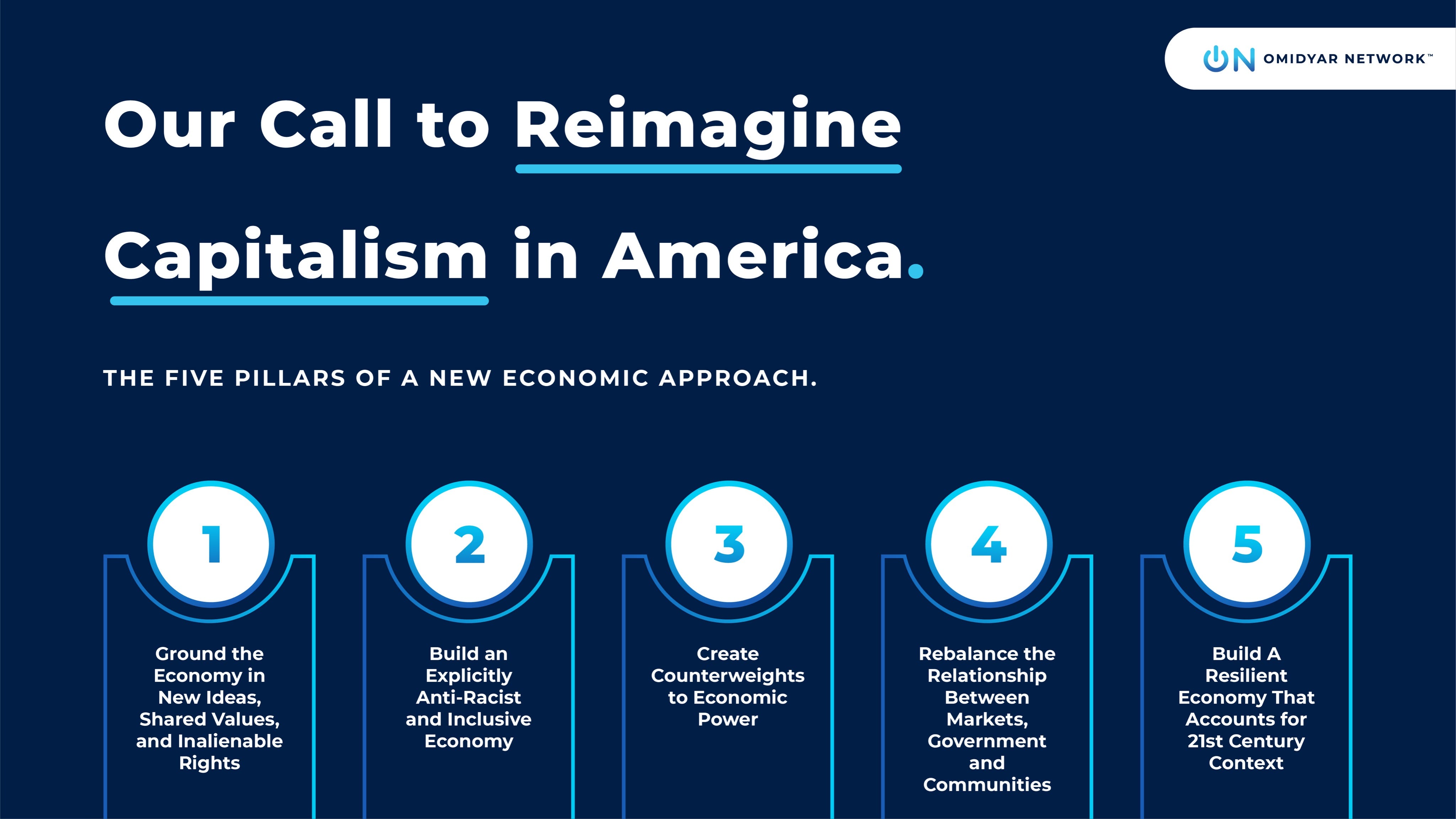
This post expands on the second key pillar for building a new economic paradigm as outlined in Our Call to Reimagine Capitalism. Read the first post in this series, “An Introduction to Ideas, Rules, and Power and How They Shape Our Democracy and Economy” here.
By Audrey Stienon, Analyst, Reimagining Capitalism
The current context
Last summer, the protests and demonstrations that erupted across the country in response to the murders of George Floyd, Breonna Taylor, and too many others prompted many funders, including Omidyar Network, to think more critically about our role within a system that perpetuates racial injustice. We wanted to determine ways in which we could use our power and privilege to contribute to dismantling white supremacy (you can read more about our commitments here and here).
While criminal justice and policing reform is not one of our focus areas at Omidyar Network, there is a close link between economic injustice and racial violence, which is why we called out the need to build an explicitly anti-racist and inclusive economy as the second pillar upholding our reimagined vision for capitalism. It is impossible to build a more just and equitable economy without directly addressing the ways in which our existing economy was intentionally designed to uphold white supremacy by excluding people from opportunities to participate fully in markets based on their race — not to mention gender, class, nationality, disability, and other forms of human diversity.
Our conviction in the necessity of this pillar has only been compounded by the evidence of the past year.

In the six weeks that it has taken to write and edit this piece, there have been two mass shootings in Atlanta and Indianapolis that targeted Asian Americans. Police officers killed 20-year-old Daunte Wright in Minnesota, 13-year-old Adam Toledo in Chicago, and 16-year-old Ma’Khia Bryant in Ohio. A ceaseless drumbeat of violence and trauma continue unabated, with only a glimmer of accountability in the trial and conviction of Derek Chauvin for the murder of George Floyd.
Meanwhile, the pandemic has exposed the extent to which the prejudices of the past remain embedded in the institutions and systems that we rely on today — to disastrous effect.
During the initial wave of the pandemic, many spoke of COVID as a great equalizer — a universal threat indifferent to our race, nationality, or class. Yet it quickly became clear that, although the virus itself cannot discriminate, our healthcare and economic structures certainly can and do. Every aspect of the pandemic and our healthcare response was impacted by race. The virus itself spread more quickly in communities of color, and took a greater toll on welfare and lives. Meanwhile, COVID tests and lifesaving PPE were more readily available in white neighborhoods at the beginning of the pandemic —and many of these inequities persist.
The effects of the economic recession are similarly shaped by race. As new data from our recent Great Jobs survey with Gallup confirms, Black, Latinx, and Asian-American and Pacific Islander workers are over-represented in essential, frontline industries such as health care, transportation, and retail, causing them to face greater risk of COVID exposure. Even as our economy has inched toward recovery, Black and Latinx workers, and especially women, are regaining their jobs much more slowly than their white counterparts. Meanwhile, women, and especially women of color, were both more likely to lose their job or find it necessary to dedicate their time exclusively to unpaid care work, erasing decades of gains in women’s labor force participation and wages.
These inequalities were not inevitable. Rather, this uneven toll stands as a physical manifestation of our history, etched into our society with every job, home, and life lost. An enduring lesson from this pandemic must be that, even when we face a threat like a virus that cannot intentionally discriminate between us, the institutional and cultural legacies that we have inherited from past efforts to purposefully divide us will ensure that our experiences are unequal and unjust.
A long legacy of exclusion
This persistence of social disparities should surprise no one, since intentional exclusion has long been the norm in the United States. For centuries, the power to shape our laws, government, markets, culture, and biases has been restricted by race, gender, and class. Varied forms of exclusion — from slavery and disenfranchisement to imprisonment, institutionalization, and deportation — have been justified by those in power (predominantly white men) in order to concentrate the benefits of American prosperity into their own hands. Acts — and threats — of physical violence against people of color have played a central role in upholding this dynamic, echoes of which we have seen play out in the violent snapshots of police brutality across the country today.
America’s history of racial exclusion has been integral to shaping our economy, denying people of color the opportunity to profit and accumulate wealth from their own contributions to our economy. The earliest form of American capitalism was one that enriched white Americans who stole land from Native Americans and labor from enslaved Black people. Later iterations of our economy not only permitted racial discrimination, but also exempted employers in sectors with a majority Black or Latinx labor force (namely agriculture, hospitality, and domestic services) from legal requirements to provide a minimum wage, workplace protections, and benefits. Meanwhile, developers, city planners, and the real estate industry redlined Black families into homes and communities with limited job opportunities, few financial service providers, and failing infrastructure. All of these systems were created with the intent of perpetuating white economic supremacy, and, in many cases, remain the foundation of the economy we experience today.
These patterns of economic marginalization and exploitation are crucial to maintaining power imbalances. Robbing people of the ability to accumulate wealth is tantamount to robbing them of the ability to accumulate power. After all, people without savings find it more difficult to change jobs, to choose where or with whom to live, or to contribute time and money to politics. And those robbed of their wealth have less to pass on to their children, thereby perpetuating this theft of opportunity across generations.
In recent decades, efforts to intentionally exclude people of color, and especially Black Americans, from participating in the markets and accumulating wealth and power may have been less overt, but not less effective. For the past fifty years, we have relied on markets to solve our social problems, even though markets are mechanisms in which people with existing wealth and assets use investments to gain even more wealth and assets. Superimposed over an unequal society, free markets can only exacerbate those inequalities. Meanwhile, many of those in power have worked to weaken the very institutions — government, labor unions, our social safety net — that could mitigate these market imbalances.
Supporting organizations working to build an anti-racist economy
Omidyar Network is committed to building an economy that is explicitly anti-racist and inclusive. An economy which simultaneously rejects the justifications for racism and consciously works to remove the structures of our society that perpetuate racial injustice. We are working toward a society where everyone has the power and ability to live the life of their choosing — free to choose their job, choose where they will live, choose how to invest their time and resources, and choose who represents them in government.
A first step toward achieving this vision is to correct the power imbalances that prevent people of color from have a voice in how the economy impacts them. That’s why we support Action Center on Race and the Economy (ACRE), an organization that provides support to groups on the ground campaigning for structural change of, and increased accountability from, the financial sector. ACRE helps grassroots organizations identify the ways in which the financial sector contributes to such challenges as healthcare, housing, the environment, and policing and incarceration. During the pandemic, ACRE was part of a coalition that supported the We Strike Together campaign, using rent and mortgage strikes to secure relief for renters during the crisis.
Similarly, Community Change, represents networks of local organizations building power with people of color so they have a say in policies that impact their lives. Its strategy includes efforts to strengthen organizing infrastructure in communities of color, and to increase their influence and develop new models of sustainable, volunteer-led community organizations.
A second task is to address the ways that existing economic rules perpetuate exclusion, either by changing policies or finding innovative ways to work around an unjust system. One of our partners, National Domestic Workers Alliance (NDWA), advocates on behalf of the 2.5 million nannies, house cleaners, and care workers across the country, most of whom are women, especially Black, Latinx, Native, and Asian American Pacific Island women. During the pandemic, NDWA distributed $400 in emergency support to more than 40,000 domestic workers who had lost their jobs during the lockdowns, and helped successfully advocate for the American Jobs Plan to include a $400 billion dollar investment in care jobs.
Finally, we must weed out and uproot all remaining vestiges of the ideas used to justify exclusion and division, and help new ideas take root. That’s why we support the work of academics, researchers, and other movement and thought leaders who study the stratifications of our economy and propose pathways forward. Most notably, we have worked closely with Professor Darrick Hamilton of The New School, a leading economist whose work explores the ways that existing systems perpetuate racial inequality and offers proposals — such as baby bonds or a federal job guarantee — to make the future economy more equitable. We also support the work of Demos, a think tank for race-forward progressive policy ideas and an advocacy network that aims to increase the power that communities of color have over economic decisions. It has, for example, designed a platform of policies for equitably addressing the climate crisis and expanding the availability of debt-free college. Demos is also releasing a number of policy proposals to ensure that our pandemic recovery brings us closer to a more democratic and inclusive economy. We believe it is imperative that these ideas are not cordoned off in think tanks or academic institutions, but rather shaped in partnership with those communities that are most impacted — building a ladder from the grassroots all the way up the ivory tower.
Far from being a time of solidarity and common endurance, this past year exposed a whole host of enduring racial injustices. Our institutions, built on foundations of intentional exclusion, deepened and perpetuated divisions built on old biases and hatreds, that have been nourished for centuries. However, even as the country witnessed the devastation of the pandemic — layered over the continued translation of hate into outright violence against people of color — many responded by joining the movement for racial justice.
The incredible work of our Reimagining Capitalism grantees is setting a course to build power with communities of color, rewrite the rules that have privileged white and wealthy people for so long, and reshape our ideas of racial justice and equity.
As America rebuilds, it is the mutual responsibility of funders to be anti-racist in rectifying the consequences of centuries of systemic racism that have robbed communities of color of their wealth, power, and rights, and to ensure that the economic system that is rebuilt supports an inclusive society in which everyone can live with dignity and thrive.

